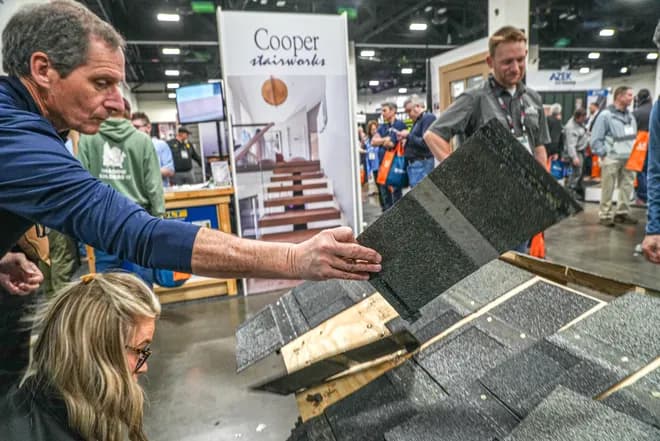PROVIDENCE – What will tariffs mean for the residential construction industry?
It depends.
For asphalt shingle producer TAMKO, the answer is that tariffs are going to hurt consumers.
At the JLC Live Residential Construction Show that took over the Rhode Island Convention Center last week, the answers swung wildly from manufacturer to distributor, all depending on complicated supply chains and raw materials.
TAMKO’s Stephen Hartnett was selling asphalt shingles on the basis that they’re so sturdy, even most hurricanes aren’t powerful enough to strip them off the roof (rated for 130 mph), although the shingles won’t stop the roof from being ripped off the house.

How will the residential construction industry be affected by tariffs?
The oil needed to make asphalt shingles comes from Canada, as American oil is just too rich. TAMKO can’t get the oil anywhere else, Hartnett said.
TAMKO could eat the cost, or it could raise prices. Since all the other asphalt shingle manufacturers get their oil from Canada, the most likely scenario is that all the companies raise their prices to account for the industry-wide increase, even if the shingles are produced in the United States.
Canadian shingle manufacturers will feel the most pain when exporting to the American market because of the cost of tariffs on their finished product, Hartnett said.
Canadian wood: Manufacturers and sellers of anything wood related are going to feel the pinch. Wood is one of the most-used materials in residential construction (aluminum and steel are more prevalent in commercial and large residential buildings), and much of it comes from Canada.
New Hampshire wood supplier Weyerhaeuser’s John Evans said much of their raw materials come from Canada, which will be hit by tariffs. The company owns 12.4 million acres of timber in the United States and manages 14 million acres in Canada.
While the structural components are manufactured in the United States, the imported wood will still be hit with the tariffs.
Industry by industry: JLC Live Residential Construction Show exhibitors for decking, either distributors or manufacturers, mostly reported that they won’t be affected by tariffs.
One company is making material that can be used for decking, siding or other uses out of a composite of rice husks, shipped from a farm a few miles away from the manufacturing plant, and plastic.
Another is making deck planks out of crushed limestone and plastic, but all the raw materials come from the United States, and the manufacturing is done in the country as well.
Uncertainty still hanging around tariffs
Commercial construction: In the commercial construction space, Skanska Executive Vice President Bryan Northrop said “uncertainty is a great word” to describe what’s going on.
The company is helping its clients figure out where they might see increased costs, if materials can be swapped, and if it’s worth trying to buy American versions of products to get a little cost savings.
The catch: “If everybody in construction goes purely toward American fabricated, we’ll have shortages on products or longer lead times,” Northrop said.
With increased demand for American-made products, the price will likely rise to be level with or higher than the foreign products with the added tariffs. But here’s the second catch:
“We’re still kind of in the infancy of all this,” Northrop said.